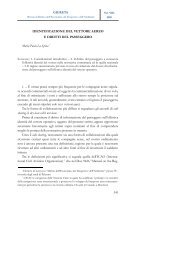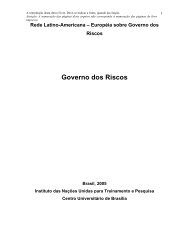Rome II and Tort Conflicts: A Missed Opportunity Abstract Contents
Rome II and Tort Conflicts: A Missed Opportunity Abstract Contents
Rome II and Tort Conflicts: A Missed Opportunity Abstract Contents
You also want an ePaper? Increase the reach of your titles
YUMPU automatically turns print PDFs into web optimized ePapers that Google loves.
SYMEON C. SYMEONIDES ROME <strong>II</strong> AND TORT CONFLICTS<br />
To be sure, in some cases, the two objectives will lead to the same law. For<br />
example, if the pre-existing relationship is a family relationship centered in state X,<br />
then the law of that state will govern that relationship <strong>and</strong>, under the above quoted<br />
139<br />
provision, the court may apply the same law to a related delictual obligation. If,<br />
140<br />
however, the relationship is contractual, then there is no guarantee that the state in<br />
which the relationship is centered will also be the state whose law will govern the<br />
contract. For example, the contract may contain a choice-of-law clause stipulating for<br />
the law of state Z, even if that state has a relatively tenuous but otherwise sufficient<br />
141<br />
connection with the relationship. In such a case, the question is which, if any, of the<br />
two states, X or Z, will be the c<strong>and</strong>idate for the closer connection exception? Z cannot<br />
be because, in this scenario, it does not have a close enough factual connection. On<br />
the other h<strong>and</strong>, X has the factual connection, but the application of its law will defeat<br />
the apparent purpose of this exception, which is to apply the same law to both the tort<br />
<strong>and</strong> contract aspects of the case. 142<br />
Finally, the main advantages of applying the same law to both the tort <strong>and</strong><br />
contract aspects of a dispute are practicality <strong>and</strong> simplicity. Obviously, these<br />
advantages are not present when the particular dispute involves only tort issues. In<br />
such a case, the rationale for this exception must be sought elsewhere, such as in the<br />
ostensible expectations of the parties.<br />
4. Compensation for Traffic Accident Victims<br />
139. The same result can be obtained more directly through the common-residence rule of Paragraph<br />
2. This illustrates that the above quoted sentence of Paragraph 3 is superfluous in most cases<br />
in which the parties to the relationship are residents of the same state.<br />
140. If the relationship is merely social rather than legal, as in Babcock v. Jackson in which the<br />
parties where neighbors who drove together from New York to Ontario, it makes little sense to<br />
say that the tort will be governed by the same law that governs the relationship because the<br />
social relationship may not, as such, be governed by any law. However, it does make sense to<br />
say that the tort will be governed by the law of the state in which the relationship was centered.<br />
141. Under the <strong>Rome</strong> Convention, the choice of state Z law will be upheld unless “all the other<br />
elements relevant to the situation at the time of the choice are connected with [another]<br />
country.” Even then, the choice will be disregarded only to the extent it “prejudices the<br />
application of rules of the law of that [other] country which cannot be derogated from by<br />
contract.” ROME CONVENTION, art. 3(3) (emphasis added).<br />
142. Another variation of this problem is when the contract contains a choice-of-law clause that is<br />
partially ineffective under the <strong>Rome</strong> Convention. For example, under art. 6, a choice-of-law<br />
clause in an employment contract will be disregarded to the extent it would deprive the<br />
employee of the protection afforded by the m<strong>and</strong>atory rules of the state in which the employee<br />
“habitually carries out his work.” However, the rest of the contract will be governed by the<br />
chosen law. Thus, if a German company hires in Germany a German employee for work in<br />
Belgium <strong>and</strong> the clause stipulates for German law, the clause will be ineffective to the extent<br />
it violates Belgian m<strong>and</strong>atory rules but effective with regard to the rest of the contract. One of<br />
the questions in such a case is which of the two countries (<strong>and</strong> for what issues) would qualify<br />
as the “contract state” for purposes of applying the exception of art. 4(3) of <strong>Rome</strong> <strong>II</strong>.<br />
56 AMERICAN JOURNAL OF COMPARATIVE LAW (2008) PAGE 32 OF 46



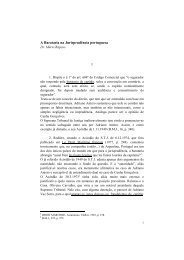

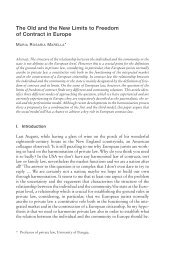


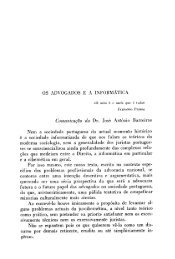
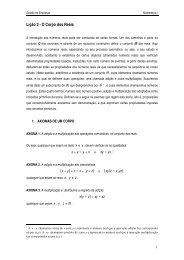

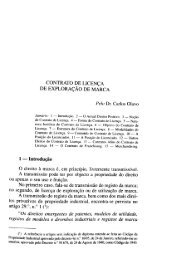
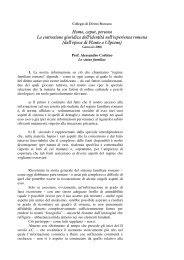
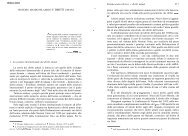

![Luigi Sapio Nozione di islām La parola “islām” [ ] è il mas.dar1 ...](https://img.yumpu.com/15836073/1/185x260/luigi-sapio-nozione-di-islam-la-parola-islam-e-il-masdar1-.jpg?quality=85)
